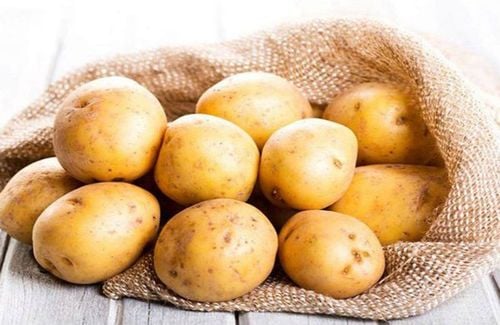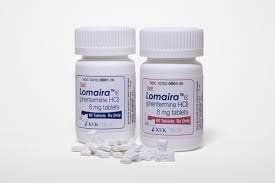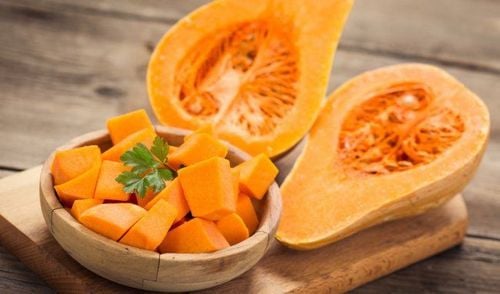This is an automatically translated article.
Potato is a good vegetable for the human body. However, you should only apply the rule of eating nothing but potatoes for 3-5 days, if prolonged this rule will lead to an unhealthy relationship with food, loss of muscle mass, lack of nutrients. and gain weight over time.
1. Nutritional composition of potatoes
Potato is a common vegetable tuber around the world, the scientific name is Solanum tuberosum, belongs to the nightshade family of plants, native to the Andes of South America. Currently, potatoes are grown in 160 countries worldwide, with 1,500 - 2,000 different varieties, diverse in color and size.
The nutritional composition of potatoes is similar, the flesh is rich in starch and covered with a thin layer of skin, the peel contains a lot of fiber as well as other nutritional components. Potatoes can be prepared in many different ways, such as boiled, steamed, fried, baked and used in a variety of dishes.
According to research, in one medium baked potato (about 173 grams), including the skin and intestines, provides the following essential nutrients:
168 calories; 0 grams of fat ; 5 grams of protein ; 37 grams of carbs; 4 grams of fiber; 24 milligrams of sodium; 37% of the RDI vitamin C ; 31% of the RDI for vitamin B6 ; 27% of the RDI for potassium; 20% of the Manganese RDI. However, the nutritional composition of potatoes can vary depending on the type and processing method of each person.
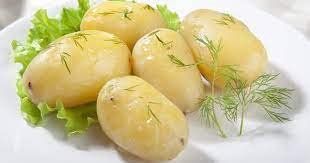
Khoai tây có thể được sử dụng để ăn kiêng
2. Does eating potatoes help with weight loss?
“Is it fat to eat potatoes?” or “can you eat potatoes to lose weight?” There are no specific studies yet. However, potatoes contain few calories, so they can help you lose weight if you follow the right rules. In particular, potatoes contain proteinase 2 inhibitor compounds, which help you reduce hunger by slowing down the digestive process.
One study found that rats treated with a potato compound ate less and lost more weight than untreated mice. However, these effects have not yet been studied in humans.
Therefore, the potato diet may be effective for short-term weight loss, but it is not a long-term solution. Potatoes are nutritious, but they are very low in calories and do not contain all the nutrients needed for good health. This can lead to slow metabolism, decrease in muscle mass, affecting human health.
3. Rules when dieting with potatoes
In 2016, Tim Steele published the book “Potato Hack: Weight Loss Simplified” with the content: “Potatoes are the best diet food ever invented”. He believes that potatoes have the ability to strengthen the body's immune system, improve gut health and provide many nutrients to keep you full of energy during weight loss.
People who follow this diet have had the expected results. A good example is magician Penn Jillette, he ate nothing but potatoes for the first 2 weeks and lost 8 kg. Although, many people claim that this diet has helped them lose significant weight, there is no scientific research to support this method.
The potato diet comes with quite a few instructions. Although some variations exist, Tim Steele outlined 7 basic rules in his book:
Rule 1: Eat only cooked potatoes 3 - 5 days. Rule 2: As a general rule, eat 2 - 5 pounds (0.9–2.3 kg) of potatoes per day. Rule 3: Do not eat any other foods, including condiments and sauces, such as ketchup, butter, sour cream, and cheese. Rule 4: Salt can be added if you absolutely must, but try to limit it. Rule 5: When you are thirsty, drink only water, plain tea or black coffee. Rule 6: Do not do heavy exercise, do light exercise and walk. Rule 7: Take your usual medications as directed by your doctor, but limit your use of any over-the-counter supplements. In Steele's version of the diet, only white or White Russet potatoes, Yukon Gold and red potatoes are allowed. Other variations of this diet seem to be more comfortable, allowing the use of sweet potatoes, herbs, and spices in the daily diet.
In summary, according to Tim Steele, there are 7 basic rules for the potato diet, of which the main rule is to eat nothing but potatoes for 3 - 5 days.
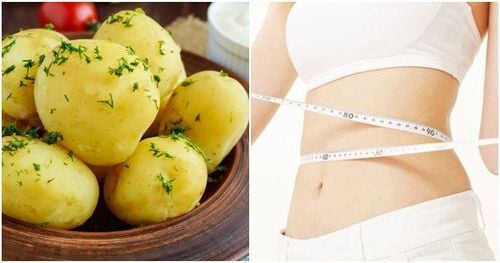
Để giảm cân bằng khoai tây cần tuân thủ các nguyên tắc
4. Some potential dangers of the potato diet
The potato diet may present a number of potential risks as follows:
Lack of protein, fat and other essential nutrients Potatoes are a nutritious part of the diet, but not meet all of your nutritional needs. Because, potatoes do not contain protein and fat, low in calcium, vitamin A and some B vitamins. Therefore, if you eat potatoes for a long time, you may face the risk of deficiency of some important nutrients for the body.
Loss of muscle mass When you diet with potatoes, you can lose a significant amount of muscle mass. Studies show that 18% of the weight loss of participants on a low-calorie diet comes from muscle mass. Studies also show that eating more protein can help reduce muscle loss during calorie restriction, but the potato diet lacks a source of high-quality protein.
Likely to gain weight back When following a very low calorie diet, such as the potato diet, your body can adapt by slowing down your metabolism and burning fewer calories.
This process can last for many years, even long after the end of the diet. Therefore, this is the main reason why 80% of dieters gain weight back over time.
With the limitations mentioned above, the potato diet can lead to an unhealthy relationship with food, loss of muscle mass, nutrient deficiencies and weight gain over time.
5. Potatoes can contribute to weight gain
A 2009 study, which followed 42,696 people over a 5-year period, found that eating potatoes was associated with increased waist size in women.
Also, some processed potato products, such as french fries, will contain more calories and fat than boiled, steamed or baked potatoes. Therefore, the choice of potato processing method will be a factor affecting your weight.
In short, potatoes are a good vegetable for the human body. However, you should only apply the rule of eating nothing but potatoes for 3-5 days. Extending this rule can lead to an unhealthy relationship with food, loss of muscle mass, nutrient deficiencies, and weight gain over time.
Please dial HOTLINE for more information or register for an appointment HERE. Download MyVinmec app to make appointments faster and to manage your bookings easily.
References: Healthline.com, Womenshealthmag.com







